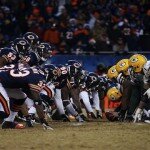Much is being made about the lack of depth at the running back position for the Detroit Lions. With Jahvid Best being placed on the Physically Unable to Perform (PUP) list, and Mikel Leshoure missing the first two games of the regular season due to a suspension, the Lions begin the season already thin in the running back department. News flash: that’s okay! The Lions still have star quarterback Matthew Stafford under center, who, as he proved last year, is the player the Lions sought just four short seasons ago.
Though injuries plagued his first two seasons, Stafford came back strong last year. Throwing his way to Comeback Player Of The Year, he threw for 5,038 yards and 41 touchdowns–and yes, received an NFL Pro Bowl snub with it. Assuming Stafford can stay healthy this year–knock on wood–the Lions have an extremely good chance of replicating their work through the air as they did last year.
But it’s not only Stafford who commands the attention of the Lions’ lethal passing attack, but Calvin Johnson, the Lions star wide receiver as well. Johnson, who caught for 1,683 yards and 16 touchdowns of his own last year, leads a very talented depth of receivers. Nate Burleson, while not putting up near the kinds of numbers Johnson did last season–and who else can really say they did?–provides the Lions with a second outside threat. Creating a dual outside threat is essential for the Lions these days. While it’s hard to conjure up a drawback to having Johnson on the team, it may only be this: he’s too good. With Johnson being double covered, or sometimes even triple covered, he at times can be completely eliminated from plays, drives, or even games depending on the defense.
But the Lions have added enough passing threats that defenses can’t do that, or at least not for the whole game. Titus Young, a rookie last year, showed spurts of talent, speed, and raw athleticism, while also displaying hints of immaturity–something expected from all rookies. However, it is encouraging to see that 17 of his 49 catches and 4 of his 6 touchdowns came in the last four games of the season last year. Also, his 607 total receiving yards is nothing to sneeze at, coming from a rookie.
The addition of Ryan Broyles may have confused some people, particularly Lions fans when watching this year’s NFL draft. “Another receiver?” I can still picture people saying it. But at closer examination, it may have been an excellent move. Without a knee injury, there’s no way Broyles would have ever made it that long in the Draft. Assuming the Lions can–and so far, successfully have–rehabilitate Broyles’ knee, they will get an excellent player at a discount rate. Throw in a couple sure-handed tight ends while potentially having four highly effective wide receivers, including the one they call Megatron, makes the Lions one of the best passing attacks in the game.
Which leads to my original point: don’t sweat the run game. While the Lions may be missing their top two running backs to suspensions and injuries, it’s not uncharted territory. Last year, the Lions ranked 29th in rushing, with just 95.2 yards per game. While that is pretty weak, they managed to be the fourth-highest scoring team in the league, with just under 30 points per game. I won’t expect that to change this year, especially when Leshoure returns in week 3, and Best in week 7.
Kevin Smith proved last year that he could still suit up and be a viable source at running back. The Lions don’t need 200 yards per game, or an all-pro tailback. All they really need is a few capable running backs to contribute on the ground, while letting Stafford go to work through the air. If defenses can at least hesitate before dropping back into coverage, Stafford’s job will be much easier. The Detroit Lions need a respectable run game, not an all-pro one. They already have that through the air.























